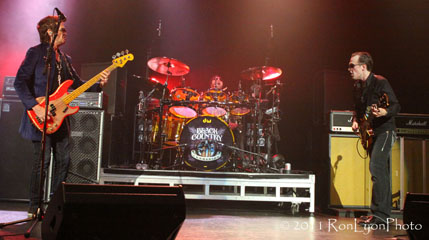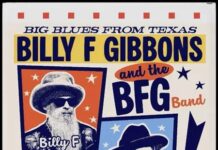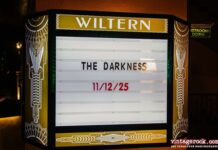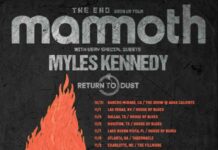Review by Shawn Perry
From Crosby, Stills & Nash (and later Young) to Asia to the Traveling Wilburys to Chickenfoot — supergroups often sound better on paper than on stage. But for Black Country Communion — former Deep Purple bassist and vocalist Glenn Hughes, renowned blues guitarist Joe Bonamassa, Led Zeppelin reunion drummer Jason Bonham and former Dream Theater keyboardist Derek Sherinian — the stage is where “super” takes on a whole new meaning. For the second stop of the band’s debut tour at the City National Bank Grove of Anaheim, BCC unleashed their brand of 70s style hard rock for nearly two hours, blowing minds, doors off their hinges, and probably a few ear drums.
With two albums under their belt — Black Country Communion 2 officially dropped four days after the Anaheim show — it only makes sense for the group to hit the highway and road-test the new material. Before that happened, however, they began the evening with “Black Country,” the very first song from their self-titled debut. Hughes, truly in his element, twanged out the bass intro and the rest of the band fell in like wildfire, scuttle butting through the stop-and-start pace of the number.
 Glenn Hughes
Glenn Hughes
Bonamassa rose to the fore, unleashing a flurry of notes during the break that defied his clean-cut, baby-face image. He may be a New Yorker, but Bonamassa cites guitarists across the pond — Eric Clapton, Jimmy Page, Jeff Beck, Rory Gallagher — as his favorites, and it clearly came through as the night progressed. After a stirring, confident run through of “One Last Soul,” the second song from their debut and one of the first they put together, the group pulled out a few from their latest, sophomore effort — an album that many in the audience had not likely heard. The intensity thickened as the soulful strains of “Crossfire,” the first of eight songs unveiled from Black Country Communion 2, danced through the air and the main riff pushed into overdrive.
One thing about the second album that distinguishes it from the first is that Sherinian’s keys get a big lift in the mix. And while it may invite the inevitable Deep Purple comparison, but it’s in those welcomed and precious moments when the keyboardist and Bonamassa cross swords and engage in a good old-fashioned dual that BCC separates itself from the measly packs of retro rockers struggling to regain ground. During “The Outsider,” which closed the set, the two went for the broke, parlaying their talents into the sort of sleight-of-hand exchanges bands like Thin Lizzy and UFO successfully integrated into their repertoires.
 Joe Bonamassa
Joe Bonamassa
For Glenn Hughes, who bravely triumphed over his own personal demons of the 70s and 80s and has been “burning” with energy and ambition for the last several years, the gig was like a homecoming (the transplanted Englishman has called California home since the 80s). Looking every bit like the rock star that he is, Hughes rattled, shook and plundered his beat-up Fender P-bass without mercy or remorse. Then there’s that distinctive, refined screech of him that dominates most of the material. Be it the raw “Man In The Middle” or the melodically enticing “Faithless,” there is no question that “The Voice of Rock” was up to the task in Anaheim.
Bonamassa’s smooth and taunting vocal graced only a few songs of the night, notably the beatific, acoustically based and totally out-of-character-for-a-band-like-BCC “The Battle For Hadrian’s Wall” and the title track from his 2009 solo album, “The Ballad of John Henry.” Certainly having two singers with completely different styles adds yet another dimension to the music of Black Country Communion. When they exchanged verses over the sharpened blues of “Song Of Yesterday” or the slippery slope of “Sista Jane,” you could tell right then and there the impetus of the band lies in its many shades, contrasts and cultural differences (BCC is playfully referred to as an “Anglo-American classic rock group” in their press releases).
 Jason Bonham
Jason Bonham
Magnificently holding it all together was drummer Jason Bonham. Having first seen him with Led Zeppelin during their 1988 reunion in New York City, later that same year with Jimmy Page, and then with his own band in the early 90s, this writer was simply flabbergasted by the finesse and poundage Bonham brings to BCC. OK, he may have learned a trick or two from his famous father, but he’s a seasoned veteran who’s held down the bottom for any number of classic acts. At every turn, Bonham’s enthusiasm, drive and impeccable timing simply gave each and every song wings to flourish and fly.
 Derek Sherinian
Derek Sherinian
The influences on BCC, without being too derivative, range far and wide from the SRV vibe of “Beggarman” to the Zeppelin-like shine of “Smokestack Woman.” After ending the show with a noble stab at Deep Purple’s “Burn,” it became seemingly obvious that while Black Country Communion does indeed cop a few reminiscent tones and squeaks here and there, they do it with a style, attack and delivery that is totally their own. That being said, one can only hope the group can carry on under the weight of its pedigree. Let’s face facts: rock and roll needs a band like Black Country Communion.




















